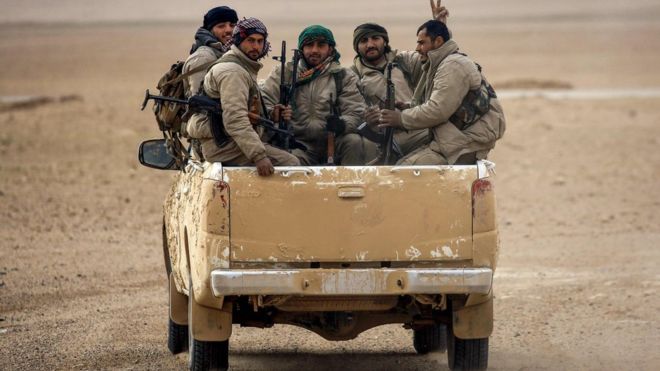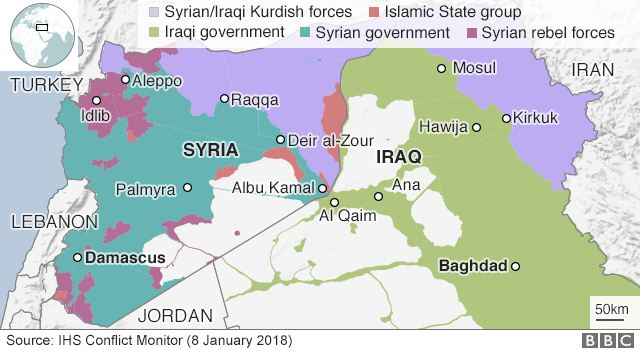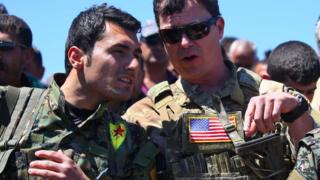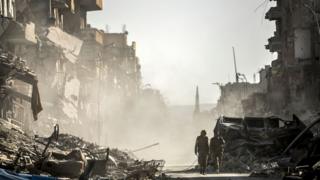Անկարան համագործակցել է Գերմանիայում գործող թուրքական հանցավոր խմբերի հետ. հետաքննություն
Դեկտեմբեր 15, 2017

Գերմանիա-Բերլին, արխիվ
Գերմանացի լրագրողների վերջին հետաքննությունը պնդում է՝ Անկարան համագործակցել է Գերմանիայում գործող թուրքական հանցավոր խմբերի հետ, և ֆինանսավորել նրանց՝ քրդերի դեմ հարձակումներ իրականացնելու, Հայոց ցեղասպանության ճանաչումից հետո Բունդեսթագի մոտ բողոքի ցույցեր կազմակերպելու համար:
Աղմկահարույց այս զեկույցը հրապարակել են Stuttgarter Nachrichten պարբերականն ու հանրային ZDF հեռաստաընկերությունը, որոնց տրամադրության տակ են հայտնվել գաղտնալսված հեռախոսազրույցների ձայնագրություններ ու հետախուզական այլ տվյալներ:
Ըստ այդմ, Թուրքիայի նախագահ Ռեջեփ Էրդողանի կուսակիցներից մեկը՝ Մեթին Քյուլունքն ամիսներ շարունակ կապի մեջ է եղել Գերմանիայում հանցավոր գործունեությամբ զբաղվող «Օսմանեն Գերմանիա» կոչվող խմբի հետ:
Հետաքննությունը նաև պնդում է, որ թուրք պատգամավորը պարբերաբար ուղղակի կամ անուղղակի գումարներ է փոխանցել այդ հանցախմբին՝ զենք գնելու, ցույցեր կազմակերպելու կամ Էրդողանի ընդդիմախոսներին ճնշելու համար:
«Օսմանեն Գերմանիան» ներկայանում է որպես բռնցքամարտիկների ակումբ կամ եղբայրություն, որը մոտ 2 հազար 500 անդամ ունի և 20 մասնաճյուղ՝ ողջ երկրի տարածքում:
Գերմանիայի իրավապահ մարմինները, սակայն, տևական ժամանակ է կասկածներ ունեն, որ թուրքական այդ խմբավորումը զբաղվում է քրեական հանցագործություններով:
Հաղորդվում է, որ թուրք պատգամավորը հիմնականում շփվել է խմբի նախկին առաջնորդ Մեհմետ Բաղչիի հետ, ով անցած տարվանից գտնվում է գերմանական բանտում՝ նախնական կալանքի տակ:
Գործով անցնող մյուս առանցքային կասկածյալը՝ խմբի փոխնախագահ Սելչուկ Շահինը, ևս ձերբակալված է: Ամիսներ շարունակված հետաքննությունից ոստիկանությունը պարզել է՝ թուրք պատգամավորը հրահանգել է բռնցքամարտիկ-գանգստերներին հետապնդել գերմանիայում ապրող քրդերին ու Էրդողանի ընդդիմախոսներին:
Գաղտնալսված հեռախոսազրույցների համաձայն, Քյուլունքը հորդորել է ձողերով հարվածել քրդերի գլխին, նկարահանել այդ հարձակումն ու տեսանյութը ուղարկել Թուրքիա, որպեսզի թուրք իրավապահները դրանցով ճնշեն ու վախեցնեն Էրդողանի ընդդիմախոսներին :
«Օսմանեն գերմանիայի» նախկին առաջնորդը հեռախոսազրույցներից մեկում պարծեցել է, թե շատ լավ կապեր ունի, և որ իր մարդիկ կարող են հեշտությամբ քրդերի հետ հաշվեհարդար տեսնել։ Այս զրույցից հետո՝ անցած տարվա ապրիլին, Շտուտգարտում քրդերի ցույցից հետո զանգվածային անկարգություններ ու բախումներ են արձանագրվել, որոնց հետևանքով տուժել է առնվազն 50 գերմանացի ոստիկան:
Անցած տարի ամռանը Համբուգի դատախազությունը հետևել էր հանցավոր խմբի առաջնորդին ու արձանագրել՝ ինչպես է նա Բեռլինում երկու հաստափոր ծրար վերցնում Քյուլունքից:
Այս հանդիպումից հետո, ըստ գերմանացի քննիչների, թուրք պատգամավորը զանգահարել է նախագահ Էրդողանին և զեկուցել՝ ամեն ինչ կարգին է: Օրեր անց արդեն Բեռլինում բողոքի ցույց է անցկացվել Բուդեսթագի կողմից Հայոց ցեղասպանությունը ճանաչող բանաձևի դեմ, որին մասնակցել են հանցավոր խմբի տասնյակ ներկայացուցիչներ:
Ձայնագրությունները վկայում են՝ Էրդողանի կուսակցից բացի պաշտոնական Անկարայի մի շարք այլ ներկայացուցիչներ և՛ս կապի մեջ են եղել հանցավոր խմբավորման հետ, ոմանք անգամ հորդորել են Գերմանիայում ապրող թուրքերին զինվել՝ խոստանալով փամփուշտ տրամադրել:
«Հետաքննական այս զեկույցը վկայում է, որ Էրդողանի ձեռքերը հասել են մինչև Գերմանիա, և սա մտահոգիչ ազդակ պետք է լինի իշխանությունների համար», - հայտարարել է կանաչների առաջնորդ Ջեն Օզդեմիրը։ Թուրքական ծագումով մեկ այլ քաղաքական գործիչ՝ ձախերի ներկայացուցիչ Սևիմ Դաղդելենն էլ կոչ է արել Բեռլինին անցնել կոնկրետ քայլերի:
Էրդողանի կուսակից Քյուլունքը հրաժարվել է մեկնաբանել աղմկահարույց այս զեկույցները, պարզաբանումներ տալու փոխարեն թուրք պատգամավորը նախընտրել է Թվիթերում մի քանի գրառում է անել ՝պնդելով, թե գերմանական մամուլը արշավ է սկսել երկրում ապրող թուրքերի դեմ:
Դեկտեմբեր 15, 2017

Գերմանիա-Բերլին, արխիվ
Գերմանացի լրագրողների վերջին հետաքննությունը պնդում է՝ Անկարան համագործակցել է Գերմանիայում գործող թուրքական հանցավոր խմբերի հետ, և ֆինանսավորել նրանց՝ քրդերի դեմ հարձակումներ իրականացնելու, Հայոց ցեղասպանության ճանաչումից հետո Բունդեսթագի մոտ բողոքի ցույցեր կազմակերպելու համար:
Աղմկահարույց այս զեկույցը հրապարակել են Stuttgarter Nachrichten պարբերականն ու հանրային ZDF հեռաստաընկերությունը, որոնց տրամադրության տակ են հայտնվել գաղտնալսված հեռախոսազրույցների ձայնագրություններ ու հետախուզական այլ տվյալներ:
Ըստ այդմ, Թուրքիայի նախագահ Ռեջեփ Էրդողանի կուսակիցներից մեկը՝ Մեթին Քյուլունքն ամիսներ շարունակ կապի մեջ է եղել Գերմանիայում հանցավոր գործունեությամբ զբաղվող «Օսմանեն Գերմանիա» կոչվող խմբի հետ:
Հետաքննությունը նաև պնդում է, որ թուրք պատգամավորը պարբերաբար ուղղակի կամ անուղղակի գումարներ է փոխանցել այդ հանցախմբին՝ զենք գնելու, ցույցեր կազմակերպելու կամ Էրդողանի ընդդիմախոսներին ճնշելու համար:
«Օսմանեն Գերմանիան» ներկայանում է որպես բռնցքամարտիկների ակումբ կամ եղբայրություն, որը մոտ 2 հազար 500 անդամ ունի և 20 մասնաճյուղ՝ ողջ երկրի տարածքում:
Գերմանիայի իրավապահ մարմինները, սակայն, տևական ժամանակ է կասկածներ ունեն, որ թուրքական այդ խմբավորումը զբաղվում է քրեական հանցագործություններով:
Հաղորդվում է, որ թուրք պատգամավորը հիմնականում շփվել է խմբի նախկին առաջնորդ Մեհմետ Բաղչիի հետ, ով անցած տարվանից գտնվում է գերմանական բանտում՝ նախնական կալանքի տակ:
Գործով անցնող մյուս առանցքային կասկածյալը՝ խմբի փոխնախագահ Սելչուկ Շահինը, ևս ձերբակալված է: Ամիսներ շարունակված հետաքննությունից ոստիկանությունը պարզել է՝ թուրք պատգամավորը հրահանգել է բռնցքամարտիկ-գանգստերներին հետապնդել գերմանիայում ապրող քրդերին ու Էրդողանի ընդդիմախոսներին:
Գաղտնալսված հեռախոսազրույցների համաձայն, Քյուլունքը հորդորել է ձողերով հարվածել քրդերի գլխին, նկարահանել այդ հարձակումն ու տեսանյութը ուղարկել Թուրքիա, որպեսզի թուրք իրավապահները դրանցով ճնշեն ու վախեցնեն Էրդողանի ընդդիմախոսներին :
«Օսմանեն գերմանիայի» նախկին առաջնորդը հեռախոսազրույցներից մեկում պարծեցել է, թե շատ լավ կապեր ունի, և որ իր մարդիկ կարող են հեշտությամբ քրդերի հետ հաշվեհարդար տեսնել։ Այս զրույցից հետո՝ անցած տարվա ապրիլին, Շտուտգարտում քրդերի ցույցից հետո զանգվածային անկարգություններ ու բախումներ են արձանագրվել, որոնց հետևանքով տուժել է առնվազն 50 գերմանացի ոստիկան:
Անցած տարի ամռանը Համբուգի դատախազությունը հետևել էր հանցավոր խմբի առաջնորդին ու արձանագրել՝ ինչպես է նա Բեռլինում երկու հաստափոր ծրար վերցնում Քյուլունքից:
Այս հանդիպումից հետո, ըստ գերմանացի քննիչների, թուրք պատգամավորը զանգահարել է նախագահ Էրդողանին և զեկուցել՝ ամեն ինչ կարգին է: Օրեր անց արդեն Բեռլինում բողոքի ցույց է անցկացվել Բուդեսթագի կողմից Հայոց ցեղասպանությունը ճանաչող բանաձևի դեմ, որին մասնակցել են հանցավոր խմբի տասնյակ ներկայացուցիչներ:
Ձայնագրությունները վկայում են՝ Էրդողանի կուսակցից բացի պաշտոնական Անկարայի մի շարք այլ ներկայացուցիչներ և՛ս կապի մեջ են եղել հանցավոր խմբավորման հետ, ոմանք անգամ հորդորել են Գերմանիայում ապրող թուրքերին զինվել՝ խոստանալով փամփուշտ տրամադրել:
«Հետաքննական այս զեկույցը վկայում է, որ Էրդողանի ձեռքերը հասել են մինչև Գերմանիա, և սա մտահոգիչ ազդակ պետք է լինի իշխանությունների համար», - հայտարարել է կանաչների առաջնորդ Ջեն Օզդեմիրը։ Թուրքական ծագումով մեկ այլ քաղաքական գործիչ՝ ձախերի ներկայացուցիչ Սևիմ Դաղդելենն էլ կոչ է արել Բեռլինին անցնել կոնկրետ քայլերի:
Էրդողանի կուսակից Քյուլունքը հրաժարվել է մեկնաբանել աղմկահարույց այս զեկույցները, պարզաբանումներ տալու փոխարեն թուրք պատգամավորը նախընտրել է Թվիթերում մի քանի գրառում է անել ՝պնդելով, թե գերմանական մամուլը արշավ է սկսել երկրում ապրող թուրքերի դեմ:




 Talysh youths showcase their traditional dance (Source: Talysh - blogger)
Talysh youths showcase their traditional dance (Source: Talysh - blogger)



 Image copyrightAFP Image captionAbout half of the border force will be made up of Syrian Democratic Forces fighters
Image copyrightAFP Image captionAbout half of the border force will be made up of Syrian Democratic Forces fighters
 Image copyrightAFP Image captionThe US-led coalition against IS has been advising and arming YPG fighters in Syria
Image copyrightAFP Image captionThe US-led coalition against IS has been advising and arming YPG fighters in Syria Image copyrightAFP Image captionIn October, SDF fighters took full control of the northern city of Raqqa
Image copyrightAFP Image captionIn October, SDF fighters took full control of the northern city of Raqqa
Comment